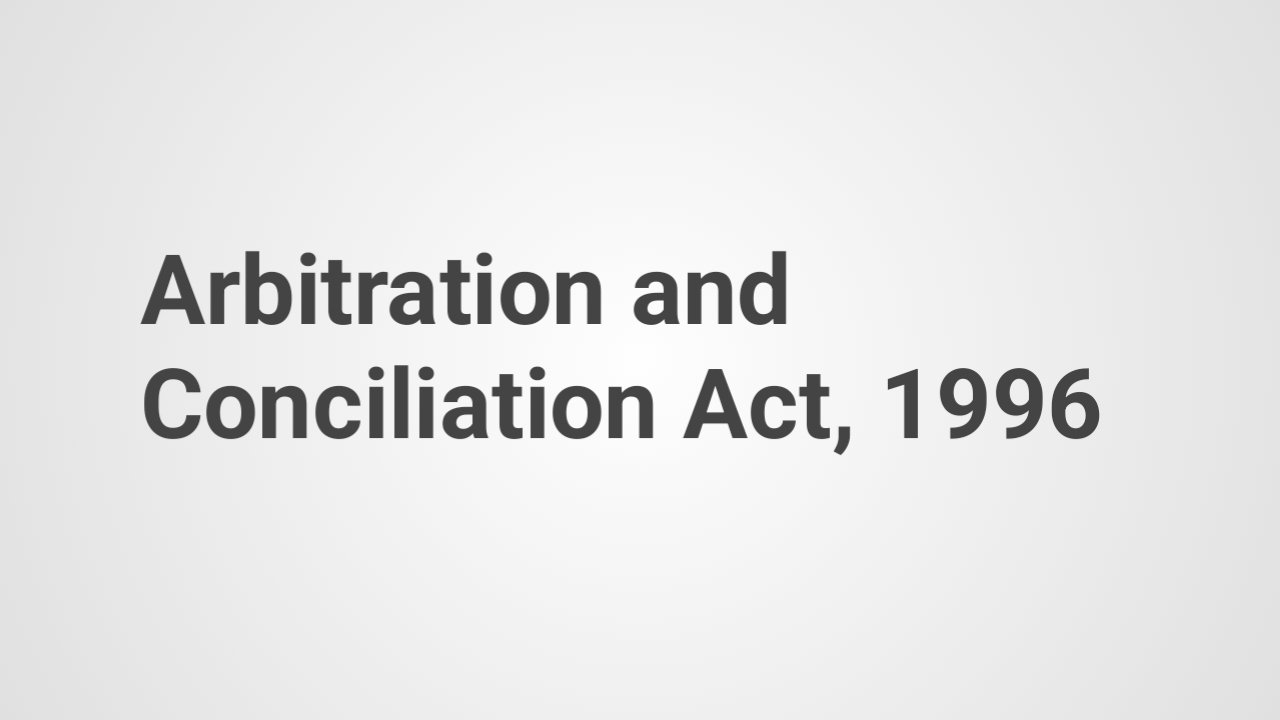Conduct of arbitral proceedings, Equal treatment of parties, Determination of rules of procedure, Place of arbitration. Commencement of arbitral proceedings, Statements of claim and defence, section 18 to 27 of this act.
Equal treatment of parties section 18 Arbitration and conciliation act, Conduct of arbitral proceedings
Section 18 of this , Equal treatment of parties , the parties shall be treated with equality and each party shall be given a full opportunity to present his case.
The court or tribunal protect natural rights respect the Principle of Audi alteram partem, both the parties have to be given equal opportunity to present there case and argument.
This section 18 is on the pattern of Article 18 of UNICETRAL modern law, Principle of natural justice and fair play must be applicable during the entire process of arbitration.
N.K Ahammad v. Madras housing board 1979 , Equal treatment of parties section 18 Arbitration & conciliation act
The supreme court held that Arbitral tribunal should create confidence, not only by doing justice between parties but also by creating a feel that justice appears to have been done.
It is fundamental principle of natural justice that no order should be passed without hearing both the parties.
Union of India v. Hindustan Development corporation 1994 ,Conduct of arbitral proceedings
Supreme Court held that where it is found that Arbitral proceedings were arbitrary unfair and were not based on principle of natural justice. The arbitral award is liable to be set aside, Arbitral award must be based on evidence.
Determination of rules of procedure Section 19 arbitration and conciliation act
Arbitral Tribunal not bound to follow common law proceedings
- (1) The arbitral tribunal shall not be bound by the Code of Civil Procedure, 1908 (5 of 1908) or the Indian Evidence Act, 1872 (1 of 1872).
- The Arbitral tribunal proceed without following the CPC or Evidence, but the basic principle to deliver justice shall not be ignored.
Parties free to agree on the procedure
- (2) Subject to this Part, the parties are free to agree on the procedure to be followed by the arbitral tribunal in conducting its proceedings.
- The Parties are free to decide which states law proceedings has to follow to solve their dispute.
Failing to agree on proceedings
- (3) Failing any agreement referred to in sub-section (2), the arbitral tribunal may, subject to this Part, conduct the proceedings in the manner it considers appropriate.
- If the parties are failed to decide which states law has to follow to solve their dispute, then the appropriate law proceedings may be followed.
Power of Arbitral Tribunal
- (4) The power of the arbitral tribunal under sub-section (3) includes the power to determine the admissibility, relevance, materiality and weight of any evidence.
Place of arbitration Section 20 arbitration and conciliation act, Conduct of arbitral proceedings
- Meeting of parties and arbitrator mutually decide place.
- to conduct the proceedings
- mutually agreement, if not then tribunal.
- 1) The parties are free to agree on the place of arbitration.
- The parties are free to agree on their agreement as when the dispute will arise which place(law) for dispute resolve.
- (2) Failing any agreement referred to in sub section (1), the place of arbitration shall be determined by the arbitral tribunal having regard to the circumstances of the case, including the convenience of the parties.
- (3) Notwithstanding sub-section (1) or sub-section (2), the arbitral tribunal may, unless otherwise agreed by the parties, meet at any place it considers appropriate for consultation among its members, for hearing witnesses, experts or the parties, or for inspection of documents, goods or other property.
Commencement of arbitral proceedings Section 21 arbitration and conciliation act
- Unless otherwise agreed by the parties,
- the arbitral proceedings in respect of a particular dispute
- commence on the date on which a request for that dispute to be referred to arbitration is received by the respondent.
Statements of claim and defence Section 23 arbitration and conciliation act
Statements of claim
- 1) Within the period of time agreed upon by the parties or determined by the arbitral tribunal,
- the claimant shall state the facts supporting his claim,
- the points at issue and the relief or remedy sought,
- and the respondent shall state his defence in respect of these particulars,
- unless the parties have otherwise agreed as to the required elements of those statements.
The parties has to claim or defence there statements within specified time determined by Arbitral tribunal.
Relevant Statement
- (2) The parties may submit with their statements all documents they consider to be relevant or
- may add a reference to the documents or other evidence they will submit.
- (2A) The respondent, in support of his case, may also submit a counterclaim or plead a set-off,
- which shall be adjudicated upon by the arbitral tribunal,
- if such counterclaim or set-off falls within the scope of the arbitration agreement.
Amend or supplement of claim and defence
- (3) Unless otherwise agreed by the parties, either party may amend or supplement his claim or
- defence during the course of the arbitral proceedings,
- unless the arbitral tribunal considers it inappropriate to allow the amendment or supplement having regard to the delay in making it.
P.H patil v. K.S patil 1957, section 23 arbitration and conciliation act
Supreme court held that tribunal may also see whether the Amendment is necessary for the purpose of determining the real question in dispute between parties.
Indian iron & Steel company v. Satna store 1991
Supreme court in this case Indian iron & Steel company v. Satna store 1991 held that Arbitral tribunal before commencing on ex parte hearing has to satisfied itself the respondent has be duly communicated regarding place, date and time venue of hearing. The respondent is also entitled to know the intention of Arbitral tribunal to proceed ex parte.
Hearings and written proceedings Section 24 arbitration and conciliation act
- Claimant
- Fact supporting his claim
- point at issue
- relief
- Respondent
- State his defence
Oral hearing
- 1) Unless otherwise agreed by the parties, the arbitral tribunal shall decide whether to hold oral hearings for the presentation of evidence or for oral argument,
- or whether the proceedings shall be conducted on the basis of documents and other materials.
Tribunal hold oral hearing
- Provided that the arbitral tribunal shall hold oral hearings, at an appropriate stage of the proceedings,
- on a request by a party, unless the parties have agreed that no oral hearing shall be held.
Adjournments oral statement
- Provided further that the arbitral tribunal shall, as far as possible, hold oral hearings for the presentation of evidence or
- for oral argument on day-to-day basis, and not grant any adjournments unless sufficient cause is made out,
- and may impose costs including exemplary costs on the party seeking adjournment without any sufficient cause.
Advance notice by Arbitral Tribunal
(2) The parties shall be given sufficient advance notice of any hearing and of any meeting of the arbitral tribunal for the purposes of inspection of documents, goods or other property.
Communicated to the other party
- (3) All statements, documents or other information supplied to, or applications made to the arbitral tribunal by one party
- shall be communicated to the other party, and any expert report or evidentiary document on which the arbitral tribunal may rely in making its decision shall be communicated to the parties.
Default of a party Section 25 arbitration and conciliation act
Section 25 of arbitration and conciliation act, Unless otherwise agreed by the parties, where, without showing sufficient cause,
- (a) The claimant fails to communicate his statement of claim in accordance with sub-section (1)(a) of section 23, the arbitral tribunal shall terminate the proceedings.
- Section 32(3) of this act provide that the mandate of the arbitral tribunal shall terminate with the termination of arbitration proceedings.
- (b) The respondent fails to communicate his statement of defence in accordance with sub section (1)(b) of section 23, the arbitral tribunal shall continue the proceedings without treating that failure in itself as an admission of the allegations by the claimant and shall have the discretion to treat the right of the respondent to file such statement of defence as having been forfeited.
- (c) a party fails to appear at an oral hearing or to produce documentary evidence, the arbitral tribunal may continue the proceedings and make the arbitral award on the evidence before it.
State of West Bengal v. Howrah Municipality 1972
Supreme court held that word sufficient cause deserve liberal interpretation with the views to advance substantial justice and fair play.
If sufficient cause if shown by party upto satisfaction of tribunal, then Arbitral tribunal under legal Obligation to extend the period of time.
Expert appointed by arbitral tribunal Section 26 arbitration and conciliation act
Appointment of expert
1) Unless otherwise agreed by the parties, the arbitral tribunal may
- (a) appoint one or more experts to report to it on specific issues to be determined by the arbitral tribunal, and
- (b) require a party to give the expert any relevant information or to produce, or to provide access
- to, any relevant documents, goods or other property for his inspection.
Participation of expert in hearing
(2) Unless otherwise agreed by the parties, if a party so requests or if the arbitral tribunal considers it necessary, the expert shall, after delivery of his written or oral report.
Participate in an oral hearing where the parties have the opportunity to put questions to him and to present expert witnesses in order to testify on the points at issue.
Expert to prepare report
(3) Unless otherwise agreed by the parties, the expert shall, on the request of a party, Make available to that party. For examination all documents, goods or other property in the possession of the expert with which he was provided in order to prepare his report.
Court assistance in taking evidence Section 27
- (1) The arbitral tribunal, or a party with the approval of the arbitral tribunal, may apply to the Court for assistance in taking evidence.
- (2) The application shall specify-
- (a) the names and addresses of the parties and the arbitrators;
- (b) the general nature of the claim and the relief sought;
- (c) the evidence to be obtained, in particular-
- (i) the name and address of any person to be heard as witness or expert witness and a statement of the subject-matter of the testimony required.
- (ii) the description of any document to be produced or property to be inspected.
Court with competence
- (3) The Court may, within its competence and according to its rules on taking evidence, execute the request by ordering that the evidence be provided directly to the arbitral tribunal.
- (4) The Court may, while making an order under sub-section (3), issue the same processes to witnesses as it may issue in suits tried before it.
Guilty of any contempt
- (5) Persons failing to attend in accordance with such process, or making any other default, or refusing to give their evidence, or guilty of any contempt to the arbitral tribunal.
- During the conduct of arbitral proceedings, shall be subject to the like disadvantages, penalties and punishments by order of the Court on the representation of the arbitral tribunal as they would incur for the like offences in suits tried before the Court.
- (6) In this section the expression “Processes” includes summonses and commissions for the examination of witnesses and summonses to produce documents.

